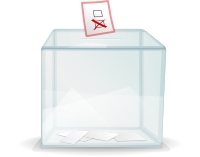Associations to the word «Poll»
Noun
- Polling
- Vote
- Voter
- Opinion
- Ballot
- Candidate
- Margin
- Conservative
- Election
- Primary
- Preference
- Liberal
- Democrat
- Majority
- Reader
- Republican
- Labour
- Survey
- Respondent
- Opposition
- Party
- Constituency
- Preseason
- Cent
- Poll
- Greatest
- American
- Nomination
- Parti
- Rasmussen
- Result
- Romney
- Locus
- Ranking
- Coach
- Pew
- Tax
- Briton
- Nebula
- Thatcher
- Caucus
- Plurality
- Exit
- Referendum
- Longhorn
- Turnout
- Candidacy
- Electorate
- Campaigning
- Pineapple
- Hillary
- Ames
- Buckeye
- Popularity
- Average
- Seat
- Deed
- Newsweek
- Aggie
Adjective
Pictures for the word «Poll»
Wiktionary
POLL, noun. A survey of people, usually statistically analyzed to gauge wider public opinion.
POLL, noun. A formal election.
POLL, noun. A polling place (usually as plural) (polling places)
POLL, noun. (now) (obsolete outside veterinary contexts) The head, particularly the scalp or pate upon which hair (normally) grows.
POLL, noun. (in extended senses of the above) A mass of people, a mob or muster, considered as a head count.
POLL, noun. The broad or butt end of an axe or a hammer.
POLL, noun. The pollard or European chub, a kind of fish.
POLL, verb. (transitive) To take, record the votes of (an electorate).
POLL, verb. (transitive) To solicit mock votes from (a person or group).
POLL, verb. (intransitive) To vote at an election.
POLL, verb. To register or deposit, as a vote; to elicit or call forth, as votes or voters.
POLL, verb. To cut off; to remove by clipping, shearing, etc.; to mow or crop.
POLL, verb. (transitive) To cut the hair of (a creature).
POLL, verb. (transitive) To remove the horns of (an animal).
POLL, verb. To remove the top or end of; to clip; to lop.
POLL, verb. (transitive) (computing) (communication) To (repeatedly) request the status of something (such as a computer or printer on a network).
POLL, verb. (intransitive) (with adverb) To be judged in a poll.
POLL, verb. (obsolete) To extort from; to plunder; to strip.
POLL, verb. To impose a tax upon.
POLL, verb. To pay as one's personal tax.
POLL, verb. To enter, as polls or persons, in a list or register; to enroll, especially for purposes of taxation; to enumerate one by one.
POLL, verb. (legal) To cut or shave smooth or even; to cut in a straight line without indentation.
POLL, adjective. (of kinds of livestock which typically have horns) Bred without horns, and thus hornless.
POLL, noun. A pet parrot.
POLL, noun. (UK) (dated) (Cambridge University) One who does not try for honors at university, but is content to take a degree merely; a passman.
POLL, proper noun. A diminutive of the female given name Mary.
POLL, proper noun. A common pet name for a parrot.
POLL, proper noun. A surname.
POLL BOOK, noun. An official register, formerly used to record votes at an election.
POLL BOOK, noun. Lists of voters and who they voted for at Parliamentary and other elections, before the introduction of the secret ballot.
POLL BOOKS, noun. Plural of poll book
POLL EVIL, noun. (obsolete) an inflammation identical with fistulous withers except that it is on the poll of a horse
POLL PARROT, noun. (dated) A tame parrot
POLL PARROT, verb. (transitive) (dated) to speak, repeat, or imitate something like a parrot
POLL PARROT, verb. (intransitive) (dated) to chatter like a parrot
POLL TAX, noun. A tax determined as a uniform, fixed amount per individual.
POLL TAX, noun. (US) A tax required in order to vote.
POLL TAXES, noun. Plural of poll tax
Dictionary definition
POLL, noun. An inquiry into public opinion conducted by interviewing a random sample of people.
POLL, noun. The top of the head.
POLL, noun. The part of the head between the ears.
POLL, noun. A tame parrot.
POLL, noun. The counting of votes (as in an election).
POLL, verb. Get the opinions (of people) by asking specific questions.
POLL, verb. Vote in an election at a polling station.
POLL, verb. Get the votes of.
POLL, verb. Convert into a pollard; "pollard trees".
Wise words
Man is a creature who lives not upon bread alone, but
principally by catch words.

